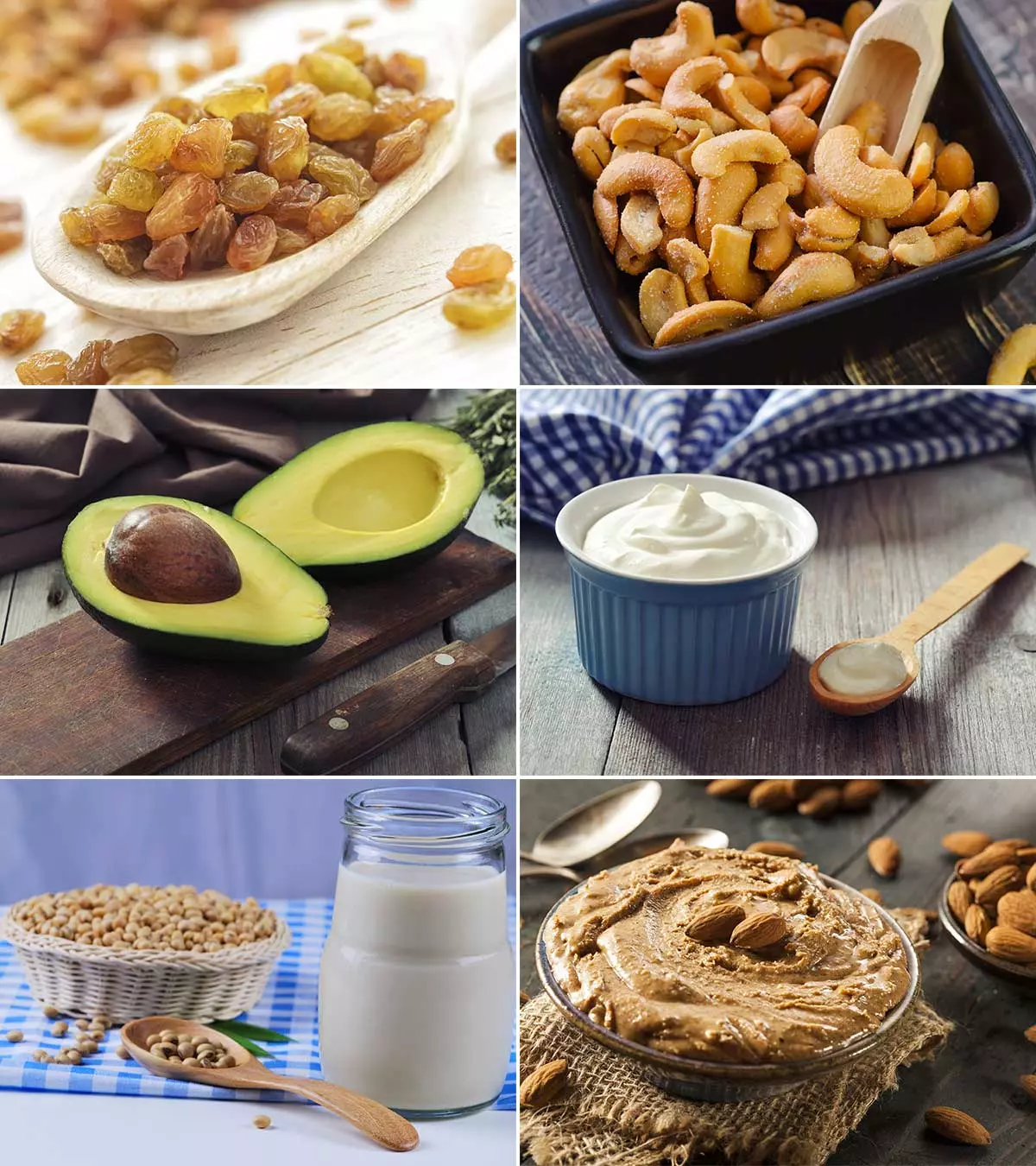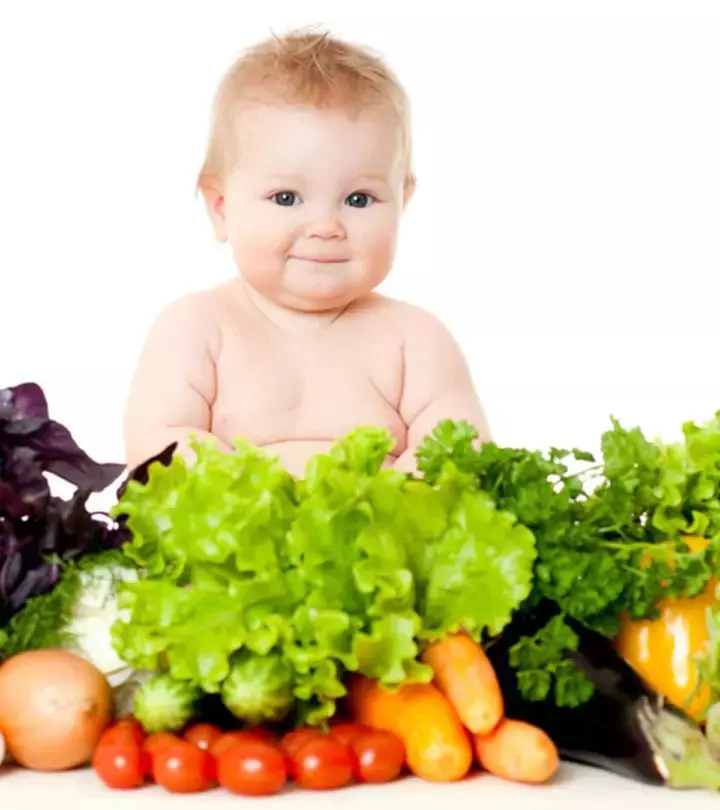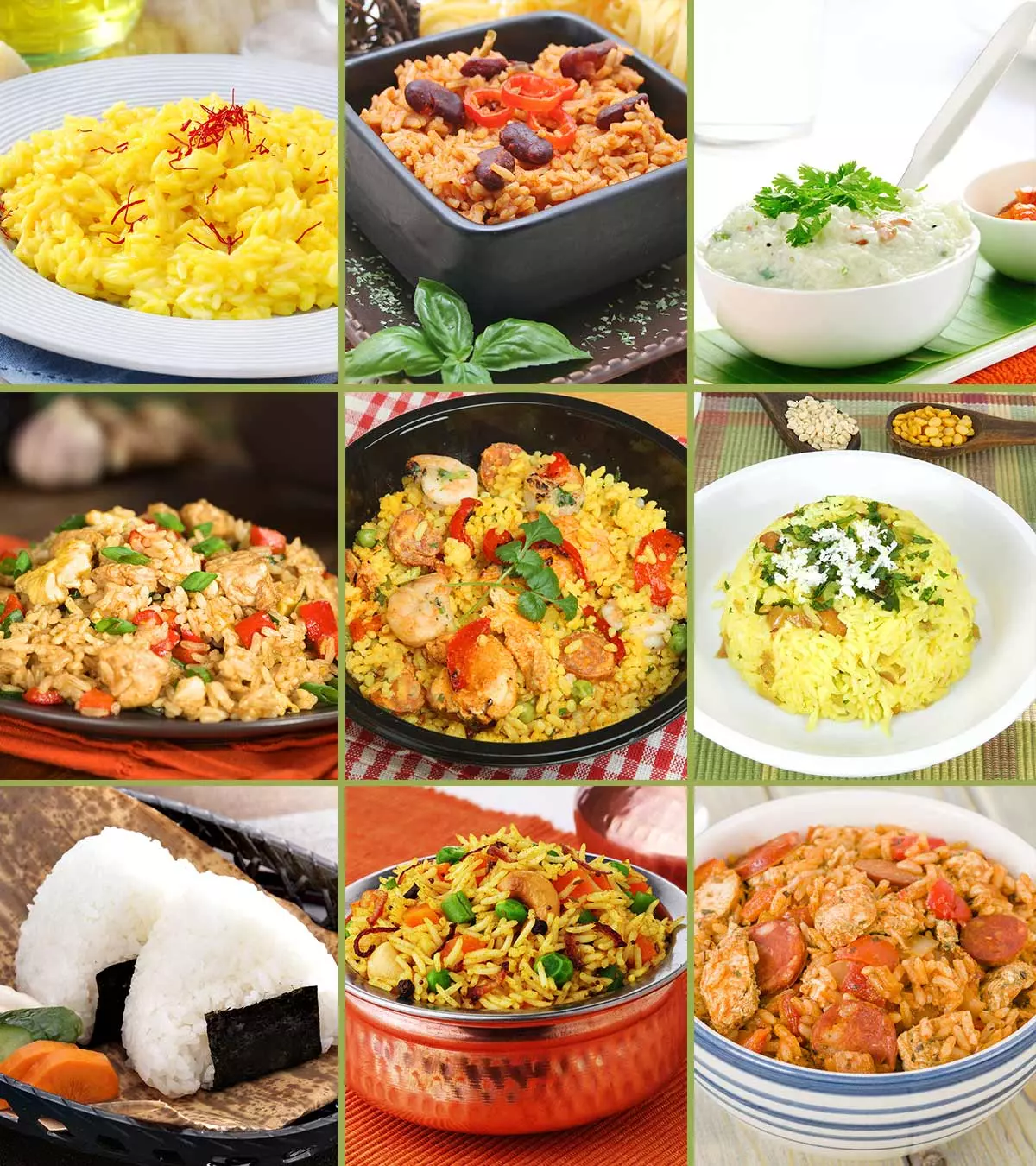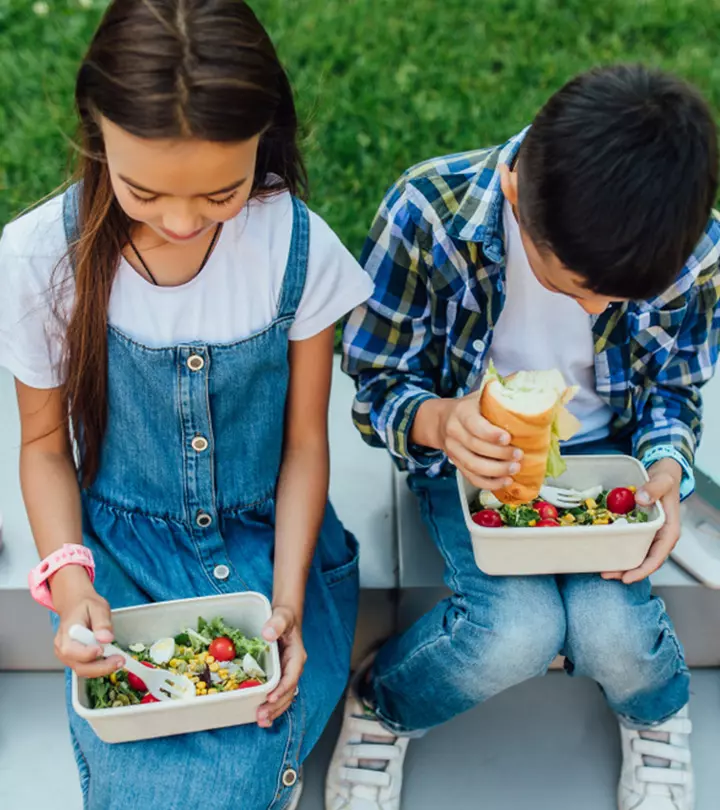
Image: iStock
Constipation in babies is a common occurrence and can cause pain and discomfort to your little one. One quick remedy for constipation is the modification of the baby’s diet. You may include certain foods to help with constipation in babies. This post explains the foods that may lead to constipation and foods that help with reducing constipation in babies.
Key Pointers
- Milk products, meat, and eggs cause constipation, while oats are rich in soluble and insoluble fiber help relieve the condition in babies.
- The fiber content of pears, along with other compounds such as fructose and sorbitol, acts as a stool softener.
- Scroll down for some recipes that alleviate constipation in your babies.
How To Tell If Your Baby Is Constipated?
A baby who is constipated could display the following signs and symptoms (1) (2).
- No stool for three days if the baby is formula-fed or on solids
- No stool for more than a week in case of exclusively breastfed babies
- Baby painfully strains to pass hard and lumpy stool
- Baby has to painfully strain for several minutes to pass some stool
- Stool appears like dry pellets or a cluster of pellets
- Baby cries each time they pass stool
- Severe constipation may lead to a bloated abdomen
Solomon, a blogger and the father of a boy says, “Our son had infrequent bowel movements, which would last for up to eight days. We would notice a decrease in his mobility during his daily play; he looked cranky with a puffed tummy. His refusal to eat anything added to the issue (ⅰ).’’
Excess strain while pooping may lead to tiny streaks of blood appearing in the stool. Consult a doctor if the baby has pain while passing stool or if the stool has blood in it (3).
 Did you know?
Did you know?Foods That Cause Constipation In Infants
Parents need to be aware of which foods may contribute to constipation. Many everyday foods, though nutritious, can cause constipation if given in excess or without enough fiber. The following food items may cause constipation in babies and toddlers.
1. Milk and milk products: A baby’s diet rich in milk protein among toddlers older than one year may increase the risk of constipation. Milk protein could often lead to hard and pale stool. All milk products, including yogurt and cheese, could be a source of milk protein (1).
2. Processed foods: These include solid foods made with refined wheat flour, such as hot dogs and white bread, and sugary foods, such as candies. These food items are starchy and have very little fiber, increasing the risk of constipation (5).
3. Meat and eggs: High-fat meats, such as red meat, and eggs may increase the risk of constipation in older babies and toddlers. These food items increase the risk of constipation due to their low fiber content (6).
4. Ripe bananas: Ripe bananas have very low fiber content (7). Excess consumption of bananas may lead to constipation in sensitive babies.
5. White rice: White rice lacks bran, which is the fiber-rich layer around the grain (8). Excess consumption of rice cereal may cause constipation in some babies (3).
6. Overcooked carrots: Carrots that are cooked to a soft texture could be devoid of fiber. Frequent consumption of overcooked carrots by babies may increase the risk of constipation (9).
7. Formula: Some babies may develop constipation due to formula (10). This can usually be resolved by switching to a different type or brand of formula milk after doctor’s consultation.
Most of these food items including lentils usually cause constipation when consumed in excess. Also, some of the food items, such as meat and bananas, are a source of vital nutrients for a baby’s nutrition. Therefore, you may focus on reducing their serving size or serving them a few times a week. A few food items, such as processed foods, could be eliminated from the baby’s diet.
 Point to consider
Point to considerFoods That Help With Constipation
The following food items may relieve constipation in babies and toddlers (11).
1. Oatmeal: Oats are rich in soluble and insoluble fiber, which adds bulk to the diet and improves gut health. Regular consumption of oatmeal by babies could relieve constipation (12).
2. Beans: Beans and other legumes are rich in fiber and could replace excess meat in your baby’s diet (13). Serve different types of fresh and dry beans as purees or as part of other dishes.
3. Pears: A medium-sized pear could contain up to six grams of fiber. The fruit also contains other compounds, such as fructoseiA natural sugar found in all fruits, sugarcane, and corn. and sorbitoliA water-soluble sugar alcohol found in many fruits, berries and vegetables. , which draw water into the intestines, making the stool softer (14).
4. Berries: Berries, such as blueberries and raspberries, are rich in soluble and insoluble fiber. Feeding pureed berries regularly could keep the baby’s gut healthy and ensure the timely passage of stools (15).
5. Prunes: Prunes are dried plums, rich in fiber and sorbitol, which draws water into the intestines (15). Increase water intake when eating high-fiber meals such as prunes to ensure hydration and promote bowel movements. Homemade prune juice and prune puree for babies are a popular remedy for constipation in babies.
Kaleigh, a registered dietician and mother of two children, shares how she used prunes to manage constipation in her child. She says, “I always kept them (prunes) on hand throughout starting solids and toddlerhood for days when things got backed up. I also tried to keep them in my little ones’ diets in small doses on a regular basis to prevent constipation. Prune puree pouches are incredibly convenient and easy to give to children, but you can also make your own homemade prune puree, or offer prune juice. I like to mix prunes into yogurt, oatmeal, and even use them in baked goods like baby muffins (ii).”
6. Apricots: Apricots belong to the same family as plums. The fruit is rich in fiber, and research indicates that regular consumption could improve the contraction of the large intestine (16). You may feed ripe apricot puree to young babies or cut it into thin slices and serve it as finger food to older babies.
7. Green peas: Green peas, including split peas, are high in fiber (17). Purees and mashes made from green peas make for a healthy addition to a baby’s diet for constipation relief.
8. Broccoli: Broccoli and other cruciferousiA term for all the vegetables that come from the mustard family like cabbage, broccoli and cauliflower. vegetables, such as cauliflower, are rich in fiber. They also contain a compound called sulforaphane, which supports normal intestinal function, providing relief from constipation (18). Cooked broccoli can be served as a mash or as finger food to older babies.
9. Sweet potatoes: It is a high-fiber food and contains several compounds, which could relieve constipation, according to research (19). You may serve baked or boiled sweet potatoes with skin to babies regularly.
10. Whole grains: Whole grains contain the outer fiber-rich layer called the bran. Regular consumption of whole grains could relieve constipation. You may serve whole grains, such as whole wheat, barley, and brown rice. Choose whole-grain products, such as whole-grain bread, crackers, or pasta (20).
11. Baby cereal: Whole wheat, multigrain, and 100% bran cereals are high-fiber foods that can help relieve constipation in babies and toddlers. You can include these cereals in different forms in your baby’s well-balanced weaning diet (3) (11). Adding pureed veggies and fruits to baby cereal is another way to raise babies’ overall fiber intake.
12. Apples: Apples are a good source of fiber, particularly when the skin is included. Offering pureed apples with the skin on can be beneficial for relieving constipation in babies (21).
13. Peaches: Peaches are rich in dietary fiber and can help promote regular bowel movements. Serving pureed peaches to babies can aid in easing constipation (22).
14. Spinach: Spinach is high in insoluble fiber (23). Pureeing cooked spinach and adding it to your baby’s meals can support digestive health and relieve constipation.
15. Chia seeds: Chia seeds are a rich source of dietary fiber and help soften stools and promote regular bowel movements. You can soak a teaspoon of chia seeds in water or milk and blend and add them to your baby’s oatmeal, yogurt, or purees (15).
However, consult your pediatrician before adding high-fiber foods to your baby’s diet. Also, excess fiber intake without balancing the fluid/water intake can worsen constipation. Hence, it is essential to balance the intake of fiber foods for babies with fluid consumption to effectively treat or manage constipation.
In addition to the aforementioned food items, grapes, apricots, asparagus, squash, and kidney beans are also known for their ability to relieve constipation (24). It is good to consult a doctor to determine the possible underlying cause before trying these constipation-alleviating food items. Do not feed these items in excess, instead focus on making them a part of the baby’s well-balanced diet.
 Quick fact
Quick factFood Purees To Relieve Baby’s Constipation
Here are a few recipes that you may try to alleviate baby’s bowel movement.
1. Blueberry, prune, and cloves puree (6 months+)
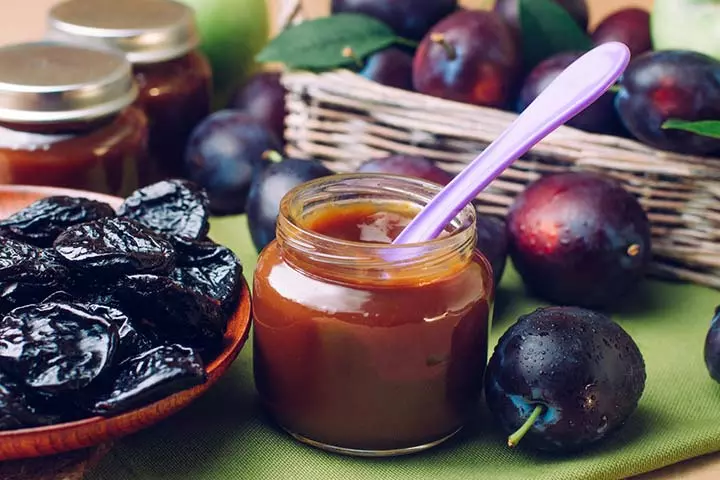
You will need:
- 1 cup blueberries
- 4 dried prunes (pitted)
- 1 cup hot water
- A pinch of grounded cloves
How to prepare:
- Wash the blueberries. Steam them until they are tender.
- Take some water in a bowl. Add the prunes and soak them for ten minutes or until they become soft.
- Blend all the ingredients in a food processor. Add the clove powder and serve immediately.
2. Apricot and pears with cinnamon (6 months+)

You will need:
- 2 apricots (medium-sized )
- 2 pears (medium-sized)
- A pinch of cinnamon powder
- 2 cups water
How to prepare:
- Wash the pears and apricots thoroughly. Cut them into small pieces.
- Pour water in a pan over medium flame.
- Add the cut fruits and cook them until they soften.
- Blend the fruits after they have cooled down. Add a pinch of cinnamon powder and serve it to your baby.
3. Broccoli and peas puree (6 months+)

You will need:
- 2 cups broccoli florets
- 1 cup peas
- 2 cups water
How to prepare:
- Heat water in a pan on medium flame. Steam the peas and broccoli until tender. Discard the water
- Let the vegetables cool. Blend them in a food processor. Add water to adjust consistency and serve immediately.
- You may add other vegetables, such as sweet potatoes, to make the puree tastier.
4. Oatmeal and apple porridge (6 months+)
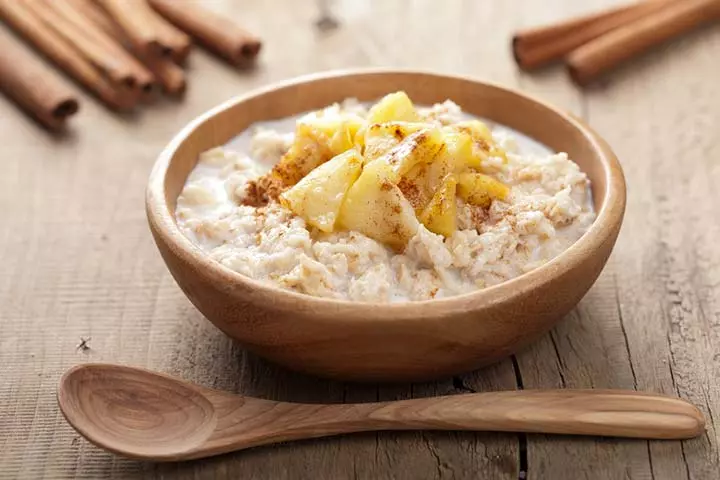
You will need:
- 1 cup sliced apples (without skin)
- 2 cups oatmeal
- 2-3 cups water
How to prepare:
- Boil water in a deep pan. Add sliced apples to it and boil them until tender.
- Add oatmeal and stir the mix. Cook on a medium flame for five to ten minutes while stirring.
- Let it cool. You may top it with a pinch of cardamom powder before serving it to the baby.
5. Apple and spinach puree (8 months+)
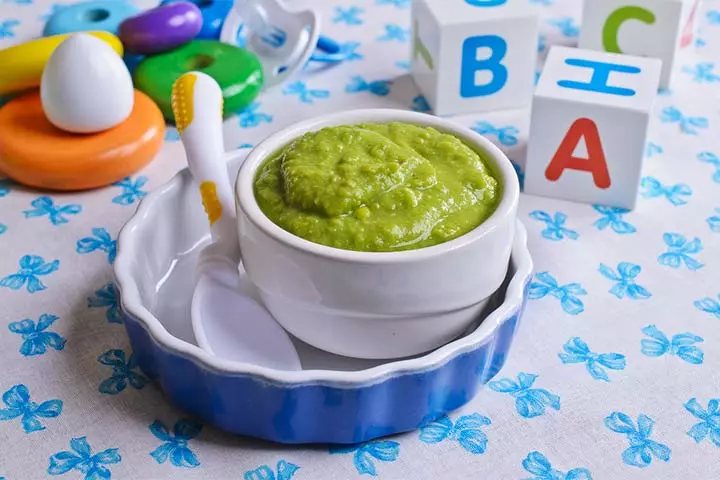
You will need:
- 2 apples (medium-sized)
- 1 cup spinach
- 2 cups water
- A pinch of ginger powder (optional)
How to prepare:
- Wash, core, and cut the apples. You may leave the skin intact. Also, wash and chop the spinach into small pieces.
- Add a cup of water to a pan and add spinach to it. Cook the spinach on a medium flame until tender. Transfer the cooked spinach to a bowl. Discard the water.
- Add a cup of water to the pan and cook the apples until tender.
- Transfer the cooked apples and spinach into a blender and blend until you get a puree of smooth consistency.
- You may top it with a pinch of ginger powder before serving.
6. Pumpkin and prunes puree (8 months+)

You will need
- 2 cups of pumpkin pieces
- 1 cup prunes
- 3 cups water
- 1 cup hot water
How to prepare:
- Soak the prunes in hot water for ten minutes.
- Heat a pan on medium flame. Add three cups of water and cook the pumpkin pieces until tender.
- Transfer the cooked pumpkin and soaked prunes into a food processor and blend into a puree. You may add more water to adjust the consistency.
7. Brown rice and sweet potato porridge (10 months+)

You will need:
- 1 cup brown rice
- 2 cups sweet potato with skin
- 4 cups water
How to prepare:
- Soak the brown rice in water for 30 minutes.
- Add four cups of water to a pressure cooker. Transfer the soaked brown rice and sweet potato pieces. Cook at peak pressure for 20 minutes.
- Once the mix is cooled, transfer it into a blender to coarsely blend it. You may add more water to adjust the consistency.
Frequently Asked Questions
1. Is apple juice good for constipation?
Yes. Apple juice can be given to babies to relieve the symptoms of constipation. Prune and pear juice are also good after three months (25).
2. Does avocado cause constipation in babies?
No. Avocado contains moderate fiber, which helps in the baby’s digestion and does not cause constipation. Also, enough exercise and easy access to the bathroom could help prevent constipation in babies (11) (26).
3. Does potato cause constipation in babies?
Potatoes contain high amounts of starch, which might cause constipation or worsen symptoms. Also, other foods such as bananas, cereals, and applesauce can cause constipation in babies (27) (28).
4. What should I do if dietary changes don’t improve my baby’s constipation?
If dietary changes don’t improve your baby’s constipation, monitor their hydration, diet, and activity level. Contact a pediatrician if your baby has gone without a bowel movement for several days. The doctor may recommend safe remedies and will check for any underlying issues. Research indicates that “dietary changes, corn syrup, or both resolved constipation in 25% of children, while laxatives resolved constipation in 92%,” highlighting the effectiveness of medical interventions when necessary (29). Always consult a doctor before using any medications or supplements for constipation relief.
A well-balanced diet with healthy options can prevent constipation. Picking the right foods for baby constipation may help improve the condition. If the issue remains troublesome for a continuous period, you must consult your pediatrician. Try to stick to natural ways of solving the issue and be patient to see the results. A natural way to deal with constipation would prove to be more sustainable and effective later. However, you must not rush to conclusions if you don’t see immediate results.
Infographic: Yummy Foods For Constipation Relief In Babies
Constipation is a typical problem in infants, especially when they start eating solid foods. While you must take your baby to the doctor if the baby has not passed any stool or is in pain, some foods can also be helpful to provide relief from constipation, as presented in the infographic below.

Illustration: Momjunction Design Team
Learn how to help your infant with constipation with six natural remedies at home. Discover the recommended foods that might bring relief.
Personal Experience: Source
MomJunction articles include first-hand experiences to provide you with better insights through real-life narratives. Here are the sources of personal accounts referenced in this article.
ⅰ. Baby constipated? Here is a homemade remedy;https://medium.com/a-parent-is-born/baby-constipated-here-is-a-homemade-remedy-7a54ad8a521a
ii. Foods That Relieve Constipation in Babies Starting Solids.
https://babyledbliss.com/foods-relieve-baby-constipation/
References
- Constipation.
https://www.healthychildren.org/English/tips-tools/symptom-checker/Pages/symptomviewer.aspx?symptom=Constipation - Bristol Stool Form Scale.
https://pediatricsurgery.stanford.edu/Conditions/BowelManagement/bristol-stool-form-scale.html - Constipation in Infants.
https://www.nationwidechildrens.org/conditions/constipation-infant - Constipation in infants and children.
https://medlineplus.gov/ency/article/003125.htm - Tips to avoid constipation.
https://www.health.harvard.edu/staying-healthy/tips-to-avoid-constipation - Concerned About Constipation?
https://www.nia.nih.gov/health/constipation/concerned-about-constipation - Following a Low-Fiber Diet.
https://www.uofmhealth.org/health-library/abo1009 - Fiber.
https://nutritionsource.hsph.harvard.edu/carbohydrates/fiber/ - Constipation Treatment for Infants and Children.
https://hsc.unm.edu/medicine/departments/pediatrics/divisions/continuum-of-care/pdf/constipation-treatment-infants-children.pdf - How Can I Tell If My Baby is Constipated?
https://www.healthychildren.org/English/ages-stages/baby/diapers-clothing/Pages/Infant-Constipation.aspx - Constipation in Children.
https://www.stanfordchildrens.org/en/topic/default?id=constipation-in-children-90-P01986 - Oats.
https://nutritionsource.hsph.harvard.edu/food-features/oats/ - Healthy eating for children.
https://www.nidirect.gov.uk/articles/healthy-eating-children - 14 Foods That Help You Get Up and Go (On a Regular Basis).
https://library.ucsd.edu/dc/object/bb0760091b/_1.pdf - 5 foods that relieve constipation.
https://www.piedmont.org/living-real-change/5-foods-that-relieve-constipation - Xiao-Jiao Yang et.al; (2016); Epidemiological study: Correlation between diet habits and constipation among elderly in Beijing region.
https://pmc.ncbi.nlm.nih.gov/articles/PMC5075555/ - Split Peas: Are they Peas or Lentils?
https://extension.illinois.edu/blogs/simply-nutritious-quick-and-delicious/2019-09-27-split-peas-are-they-peas-or-lentils - Akinori Yanaka; (2018); Daily intake of broccoli sprouts normalizes bowel habits in human healthy subjects.
https://pmc.ncbi.nlm.nih.gov/articles/PMC5773831/ - Jing-Ying Zou et.al; (2016); Improvement of Constipation in Leukemia Patients Undergoing Chemotherapy Using Sweet Potato.
https://pubmed.ncbi.nlm.nih.gov/25881813/ - Eating, Diet, & Nutrition for Constipation.
https://www.niddk.nih.gov/health-information/digestive-diseases/constipation/eating-diet-nutrition - Foods for Constipation.
https://www.hopkinsmedicine.org/health/wellness-and-prevention/foods-for-constipation#:~:text=Some%20of%20the%20recommended%20foods - All the Health Benefits of Eating Peaches.
https://health.clevelandclinic.org/benefits-of-peaches - 7 Reasons You Should Eat More Spinach.
https://health.clevelandclinic.org/benefits-of-spinach - Constipation – self-care.
https://medlineplus.gov/ency/patientinstructions/000120.htm - Constipation.
https://www.seattlechildrens.org/conditions/a-z/constipation/ - Constipation in Children.
https://www.sutterhealth.org/health/constipation-in-children - Starchy foods and carbohydrates.
https://www.nhs.uk/live-well/eat-well/food-types/starchy-foods-and-carbohydrates/ - Baby and Constipation: What You Need to Know.
https://www.mercy.net/service/newborn-baby-care/constipation/#:~:text=Excessive%20amounts%20of%20yogurt%2C%20cheese - Vera Loening-Baucke; (2005); Prevalence, symptoms and outcome of constipation in infants and toddlers.
https://pubmed.ncbi.nlm.nih.gov/15756220/
Community Experiences
Join the conversation and become a part of our nurturing community! Share your stories, experiences, and insights to connect with fellow parents.
Read full bio of Dr. Sonal Dhemla
Read full bio of Sindusha MS
Read full bio of Dr. Ritika Shah
Read full bio of Ghazia Shah









